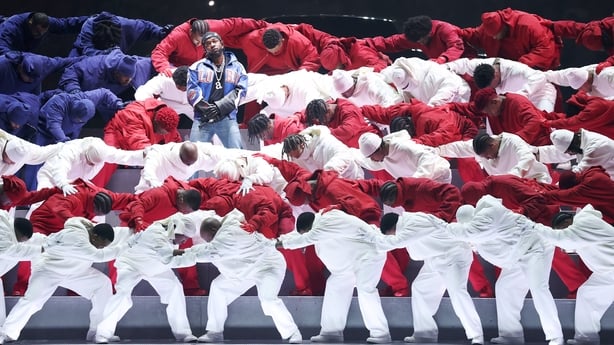It is a time-honoured tradition in music: rather than entering into a war of words in the tabloids with your closest rival, write a diss track instead.
As you may be aware, the most recent public spat has been between rap rivals Kendrick Lamar and Drake, who have been involved in a high-profile feud since March 2024 - although many have reckoned their beef stretches back over a decade.
The simmering tension between the former collaborators reached boiling point last year after Lamar took umbrage with their fellow rapper J. Cole referring to himself, Drake and Lamar as the 'big three' of rap on his song First Person Shooter. Lamar’s subsequent song Like That pooh-poohed that notion; Drake returned fire with the songs Push Ups and Taylor Made Freestyle, the latter taking potshots at everything from Lamar’s height to his collaboration with pop princess Taylor Swift.

A flurry of back-and-forth diss tracks followed in the ensuing months, each one levelling increasingly serious accusations about both rappers’ personal lives; Drake’s Family Matters accused Lamar of domestic abuse, speculated that one of his kids was fathered by producer Dave Free and suggested that his activism was performative. In return, Lamar’s Meet the Grahams - with verses addressed to his son Adonis, his mother Sandra and his father Dennis - accused Drake of fathering a secret daughter and being a manipulative sexual predator.
Standard stuff, in other words.
Then followed Not Like Us - the track that won Lamar five Grammy Awards last weekend, and was possibly the first diss track to win the prestigious Record the Year award. The song, which was released less than 24 hours after Meet the Grahams, was the most scathing take-down of the Canadian rapper yet, with lines allegedly accusing him of inappropriate sexual contact with minors ("Certified Lover Boy? Certified paedophiles") and leveraging his connections with artists from Atlanta in order to gain street cred ("You run to Atlanta when you need a few dollar / No, you not a colleague, you a f**king coloniser"). As far as the ‘contest’ goes between the pair, a Grammy Award is the equivalent to a million bonus points. Your move, Drake.

Of course, musical rivalries - particularly in rap - are nothing new; look at the whole East Coast vs. West Coast feud in the 1990s, when artists from New York’s Bad Boy Records (Puff Daddy, The Notorious B.I.G.) went head-to-head with LA’s Death Row Records (Dr. Dre, Tupac Shakur, etc.). Diss tracks have been around a lot longer, though - indeed, some of the best ones have been around for literal centuries.
Did you know that Yankee Doodle, for example, is seen by some as one of the earliest diss tracks as we now know them? You may know it as a jolly little childhood nursery rhyme, and although its melody reportedly originates as far back as the 15th century, the lyrics that we know now - "Yankee doodle went to town, riding on a pony…" - were apparently used by those loyal to the British crown during the American Civil War, to disparage the patriots (the ‘Yankees’), with the terms ‘dandy’ and ‘macaroni’ being used pejoratively.
Modern diss tracks have crossed all genres, too. Woody Guthrie, patron saint of the protest song, wrote Old Man Trump in 1954 about Donald Trump’s father Fred, accusing him of racist housing policies (we could do with a few Woody Guthries right now.) Bob Dylan picked up the baton in the 1960s with songs like Positively 4th Street, allegedly dissing his loyal Greenwich Village following after they shunned him for going electric.

Post-Beatles, John Lennon found himself the subject of diss tracks by both his former bandmate Paul McCartney on his solo tracks Silly Love Songs and Too Many People ("Too many people preaching practices / Don't let them tell you what you wanna be") and Steely Dan’s Only a Fool Would Say That ("The man in the street dragging his feet don't wanna hear the bad news / Imagine your face there is his place, standing inside his brown shoes").
We all know Carly Simon’s You’re So Vain was written about actor Warren Beatty, although arguably it’s only added to his lore over the decades. The Sex Pistols got straight to the point with E.M.I., a damning indictment of their former label after they were dropped. The pop world was not immune to prickly potshots, either: Jermaine Jackson got uber-personal with his brother Michael on his 1991 single Word to the Badd!!, a song declaring him a "lonely superstar" with various references to his songs and lines like "Once you were made, you changed your shade / Was your color wrong?" And of course, there was Justin Timberlake’s Cry Me a River in 2002, written about his ex-girlfriend Britney Spears - although since the revelations about him in her 2023 memoir, his self-righteous point of view has been somewhat diminished.

Spears didn’t write a riposte to that tune, but her fellow pop star Christina Aguilera bit back on 2003’s Can’t Hold Us Down - a diss track about Eminem, written in response to the accusations he made about her on The Real Slim Shady. "When a female fires back, suddenly big talker don't know how to act," she sang. "So he does what any little boy would do - makin' up a few false rumors or two." Lana Del Rey also used her unreleased song So Legit, leaked in 2013, to get back at Lady Gaga, who had supposedly double-crossed her ‘confidante’ Bob Leone. "Stefani, you suck / I know you're selling twenty million / Wish they could have seen you when we booed you off in Williamsburg." Ouch. And of course, Queen Tay-Tay herself is no stranger to a diss track, having previously lambasted Katy Perry (on Bad Blood), Kanye West and Kim Kardashian (on Look What You Made Me Do) and allegedly, her ex-boyfriend Jake Gyllenhaal (on We Are Never Ever Getting Back Together), among others.
The diss track has been around for centuries, and will undoubtedly be around for centuries to come, too; if history has taught us anything, it’s that we humans love setting our personal grievances to a catchy melody. So the next time your arch-enemy says or does something that irks you, hold your tongue, pick up a pen and hum a little ditty instead. It might even win you a Grammy some day.
The views expressed here are those of the author and do not represent or reflect the views of RTÉ

